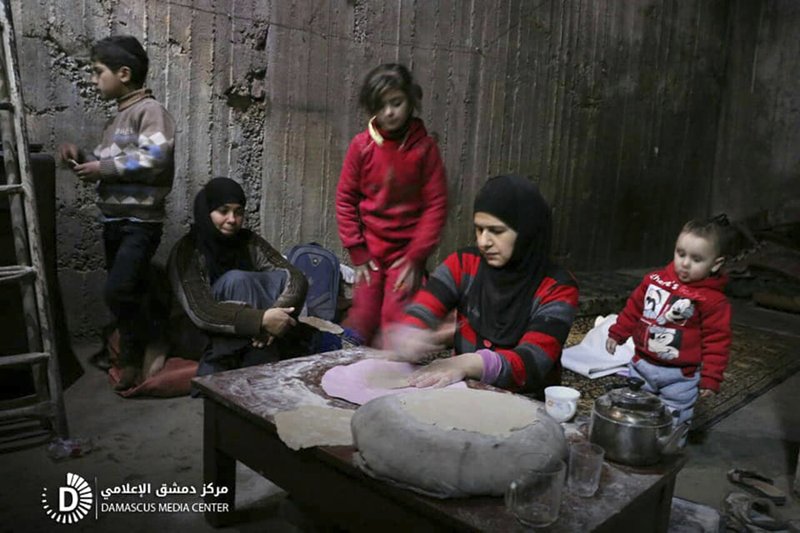Rebels in eastern Ghouta have survived years of siege but now are succumbing to a tried and tested military tactic of siege compounded with overwhelming bombardment.
The Syrian government and its backer Russia appear determined to seize the region, adding it to the latest series of victories that have consolidated President Bashar Assad’s hold on power seven years into the conflict.
Proposed truces and cease-fires have failed to stop the war machine. The Syrian rebel groups have refused to surrender, vowing to fight to their last man, saying they are defending their hometowns.
Known for its green fields and vegetable gardens that fed the capital and its residents, the once fertile eastern Ghouta is now a hell on earth.
The U.N. said 15,000 people have been reportedly driven from their homes in January, the majority staying in shelters and basements around Ghouta.
Basements have served as safe havens in other opposition-held cities and towns facing intense government bombing.
But in Ghouta, which has been under siege since 2013 and was hit even before that by government attacks, rebels have built an extensive network of tunnels. New buildings have been erected with basements, often linking the tunnel grid.
Rescuers said 18 people were killed, including women and children, in the basement of a building hit by an airstrike in Hazeh. It took rescuers 10 days to bring out the dead from under the rubble.
The teacher lives in Douma, the area’s largest town, home to an estimated 120,000 people and one of the most active front lines. She said she is afraid for herself and her family if the government retakes her hometown, but also fears the rebel factions who control the area and tolerate little criticism.
“Regrettably there is no voice for the civilians here. We can’t speak our mind or speak for the civilians. We can’t stand up to the factions and (say) tell me how did you let us get this far,” she told AP in a series of text messages, most of them recorded while she lingered in the shelter with her son. “We could have changed plans long time ago. Now, we don’t know where we are going.”
Damp and crowded, her shelter has no ventilation, is full of smoke from jittery, smoking residents and has over 70 women who permanently live there.
For hours, she chases her overactive son, sometimes grabbing him trying to climb the stairs out of the shelter. She has seen a girl knocked down those stairs by the force of a strike outside. In a nearby shelter, another child was killed by a strike as she stood outside for air.
Neemat Mohsen, who heads the local women’s office in Saqba, another town in eastern Ghouta, said in some shelters 350 or more people live with no running water and no electricity.
“In our street, over 500 meters (yards) there are only three basements. They have to house all the families there,” Mohsen said. Locals would donate generators to provide some light.
“We feel the prison shrinking. We were first besieged in an enormous prison called eastern Ghouta, now we are trapped in shelters similar to tombs,” Mohsen said.
Mohsen said she was in awe of how her shelter companions put up with the conditions. “They are stronger than mountains,” she said, holding back tears.
“We are living real terror 24 hours a day. So long as the planes are in the air, any rocket can hit anyone anywhere,” she said.
Food prices have mounted. The teacher said she feeds her son olives and whatever bread is available. Sometimes she can cook pre-packaged noodles. But she hides to eat because many with her in the shelter can’t afford or find food.
Bassam Abu Bashir, a doctor in a hospital in Sabqa, said with the front line moving away from his hometown on Ghouta’s southern edge, he has had time to go around looking for milk and medicine to distribute to the shelters. The local milk factory was bombed.
“A visit to the grocer used to be 15 minutes. Now you have to search for three hours to find food or bread,” Abu Bashir said.
Bayan Rehan, a 31-year-old activist from Douma, said tomato paste is the most common food.
Rehan left her home after a shell landed there more than a week ago. She moved her family to a shelter and went on living out of her work space, documenting the offensive and organizing aid to those living underground.
“It is a big dream for me to shower,” she said, adding with a shy giggle that she had not had a shower in 20 days.
The teacher used the basement as a temporary shelter for hours when the shelling was exceptionally intense. Her home is on a ground floor so she often crept up to sleep there, sparing herself and her son the bad air in the shelter.
The night before a truce proposed by Russia began, she slept in her home — in the bathroom, since she had invited others to stay with her, expecting a calmer day. But at daybreak, 10 airstrikes pounded the area, spraying her home with shrapnel.
So she went on a cleaning campaign in the shelter, made room for herself and moved in.
With no sanitation or running water, “going to the bathroom could cost you your life.”
She is most furious about the silence from the U.N. and the international community in the face of what she called “our forced displacement.”
“Why should we be forced out of our homes? Why is it acceptable that (the government) brings other people to live in them,” she said.
She said residents don’t want to go to Idlib, the opposition-held northwestern province where others evacuated from besieged areas have been taken. The province is ruled by al-Qaida-linked groups.
“We rejected them. Why should we live with them and then again, (the government) starts bombing us there?”



